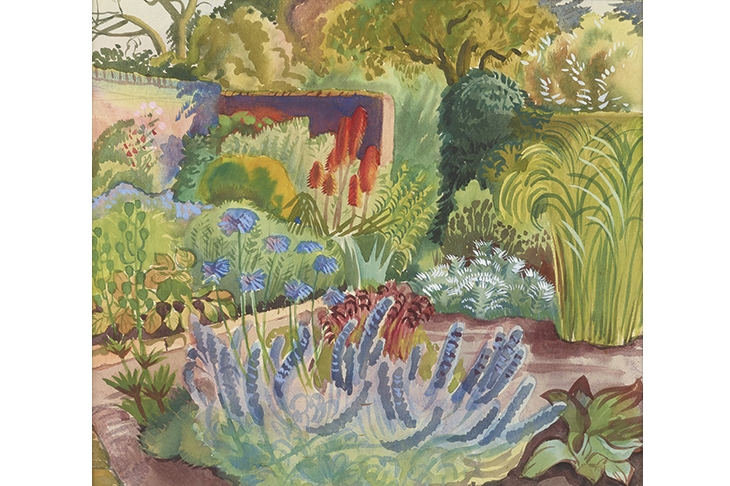Cedric Morris is often referred to as an artist-plantsman, and while as a breeder of plants, most particularly of irises, he has always been highly regarded in horticultural circles, his reputation as a painter has been subject to regular fluctuations. Last year, two excellent and complementary London exhibitions — Cedric Morris: Artist Plantsman at the Garden Museum and Cedric Morris: Beyond the Garden Wall at Philip Mould & Company — did a great deal to revive interest in his paintings; and so a joint biography of Morris and his partner Arthur Lett-Haines is welcome.
They met in 1918 at an Armistice party hosted by Lett (as he was always known) and his wife. The married couple were about to emigrate to America, but at the last moment Lett decided to stay behind and instead set up house with Morris in the artists’ colony at Newlyn in Cornwall.
The two men would live together —though not always in harmony and with some notable infidelities — for the rest of their lives, eventually settling on the Essex-Suffolk border, where they ran the East Anglian School of Painting and Drawing. It was originally established in 1937, in a rented studio at Dedham, but the building burned down two years later, almost certainly as a result of its most famous pupil, Lucian Freud, carelessly disposing of a cigarette end. Morris painted a fine picture of the gutted building and relocated the school to Benton End, in Hadleigh, a run-down 16th-century farmhouse with a two-and-a-half-acre garden, bought for him by a wealthy former lover.
The school was run on the lines of the French académies the two men had attended in the 1920s, with students encouraged to set up their easels en plein air and to work from life models rather than sculptures. Morris and Lett provided gentle (though often contradictory) guidance rather than formal tuition. Novices and amateurs worked with experienced artists, and among those who, alongside Freud, benefitted from the school’s unorthodox approach were Kathleen Hale (who had an affair with Lett, and depicted both men in her Orlando books), David and Barbara Carr (the subjects of one of Morris’s characterful portraits), the underrated Joan Warburton and Maggi Hambling.
Although Lett had his own career as a surrealist artist, he more or less sacrificed this to promoting Morris’s art and managing the school; a retrospective of his work in 1966 included no work from 1934 to 1950 because he had produced so little of it during this period. He supplied the school’s pupils with delicious meals (included in the modest fees), becoming an excellent and inventive cook whom Elizabeth David frequently consulted — though the conditions in which the food was prepared were far from ideal. Bearing ‘a martini in one hand and a plate of food in the other’, Lett would emerge from a kitchen that was buzzing with flies and covered in black dust from the coke-fired Aga, its stone sink filled with dirty crockery, its floor scattered with numerous bowls of cat food and buckets in which the proprietors’ soiled underwear had been left to soak. Meals were, however, richly supplied with produce grown in the garden, where unusual fruit and vegetables were cultivated alongside the flowers that Morris painted.
Morris made frequent trips abroad, from which he brought back plants as well as paintings, cultivars of the former earning him several RHS medals. Though sometimes dismissed (by Clive Bell among others) as merely ‘decorative’, his paintings of flowers show a passionate and knowledgeable engagement with their subject, demonstrating the same kind of flair he employed when breeding unusually coloured new irises or likening the smell of a particular salvia to ‘a whore sucking a bullseye’. He also painted remarkable pictures of birds, vibrant landscapes, and many striking portraits, the subjects of which were sometimes horrified by the results of his keenly appraising eye.
No doubt financial constraints restricted the number of illustrations in Hugh St. Clair’s biography, and to see most of the paintings he mentions you really need the lively 2002 compilation Benton End Remembered and Richard Morphet’s 1984 Tate Gallery catalogue to hand. Better editing would have prevented obvious repetitions, people being identified pages after they have been first introduced, slips such as Edward Burra being included in a list of ‘abstract artists’ and a painting of a French café scene being nonsensically mistitled ‘Le Bon Mock’ in both the plate section and the text.
St. Clair nevertheless provides a valuable introduction to his subjects’ lives and works, with particularly good chapters on the garden and the food at Benton End.






Comments